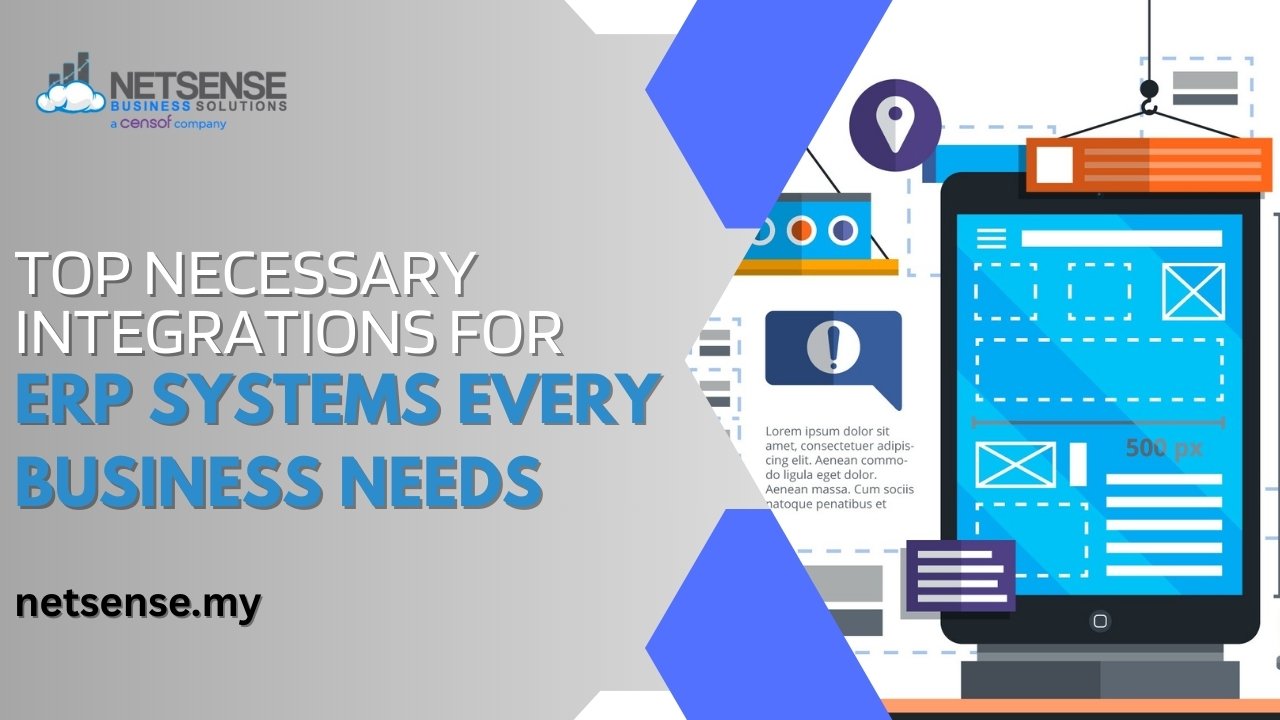When companies in Malaysia deploy an ERP (Enterprise Resource Planning) system, the ultimate goal is to find efficiency, visibility and growth. However, even the best ERP system can be detrimental if it stands alone.
In order to harness its value, companies must ensure that the ERP is integrated with their other key applications.
In this blog post, we take a look at the key integrations for ERP systems all companies need – especially for the Malaysian business reality, where agility, compliance, and digital transformation are becoming indispensable.
Accounting & Financial Management Integration
Finance is the core component of any ERP system, but many businesses simply use standalone accounting tools or bank platforms. There are several potential benefits to integrating ERP solutions with accounting and financial services. You can:
- Automate invoicing and accounts payable (AP) and receivable (AR)
- Synchronise transactions from your bank automatically into your ERP
- Ensure compliance with the Malaysian LHDN e-Invoice requirements.
- Produce real-time accounting dashboards to enable you to make smarter decisions.
With taxes becoming more stringent and the government promoting digital compliance, it has never been more critical to have financial integration to avoid human errors and major penalties.
Customer Relationship Management (CRM) Integration
Customers are the focus of business success. Linking your ERP to CRM platforms provides businesses with the ability to:
- Consolidate sales, marketing, and customer supports information.
- Provide sales teams with inventory, pricing, and customer histories in real-time.
- Make purchases more customer focused and foster customer loyalty.
- Track the entire customer journey, from a lead to after-sales support.
For SMEs in Malaysia’s rapidly growing digital economy, personal service and responsiveness can be a differentiator for their clients.
Human Resource Management (HRM) Integration
People are the backbone of every organisation. ERP-HRM integration helps manage:
- Payroll and statutory contributions (EPF, SOCSO, EIS).
- Employee attendance, leave management, and performance tracking.
- Recruitment and onboarding processes.
- Workforce analytics to align manpower with business goals.
With Malaysia’s diverse workforce and complex labour laws, HRM integration reduces compliance risks while improving employee satisfaction.
E-Commerce & Point of Sale (POS) Integration
Businesses in retail, wholesale, or e-commerce require integrated ERP with e-commerce software (like Shopify, WooCommerce, or Lazada) and POS systems. Advantages will include the following:
- Up to date stock across multiple sales channels.
- Order fulfilment and delivery tracking will be automated.
- All customer data (online or offline) is consolidated into one customer database.
- Revenue will be accurate by channel.
With increasing online shopping in Malaysia, businesses will rely on ERP-POS integration to manage omnichannel selling.
Supply Chain & Inventory Management Integration
Effective supply chain management is vital for any manufacturing, trading, or distribution organization. The use of ERP with integrated supply chain applications allows for:
- Visibility to raw materials, production, and delivery schedules in real-time.
- Inventory forecasting and management of seasonal fluctuations.
- Vendor and procurement management with additional negotiating abilities.
- Managing and reducing overstocking, and stock-outs that inhibit production.
In the face of global supply chain disruption, and increased costs, the integration of ERP, and supply chain helps organizations remain competitive and resilient.
Business Intelligence (BI) & Analytics Integration
Data is only useful when it drives decisions. Integrating ERP with BI tools (like Power BI or Tableau) helps you:
- Transform ERP data into actionable insights.
- Identify trends in sales, costs, and customer behaviour.
- Create dashboards tailored for different departments (finance, operations, HR).
- Enable predictive analytics for future planning.
Malaysian businesses striving for digital transformation must move beyond reporting to predictive insights for strategic growth.
Final Thoughts
In Malaysia’s competitive and digitally driven economy, ERP integration is no longer optional—it’s a necessity. Whether you’re in manufacturing, retail, services, or distribution, having your ERP system fully connected with finance, HR, supply chain, and customer platforms ensures a smoother, smarter, and more profitable operation.
At Netsense, we specialise in helping businesses integrate the best ERP system Malaysia with the tools they already use—so that technology truly works for you. With proven expertise in ERP implementation across industries, our team ensures your ERP delivers the efficiency and ROI you expect.
